 It’s hard to believe ChatGPT celebrated its first birthday just a few short months ago, on November 30, 2023.
Following its premiere, generative AI (GenAI) quickly became a focal point of conversations across various industries, including the legal field. As with the emergence of any new technology, questions swirled as to how it would impact legal professionals’ day-to-day work in both the short and long terms.
Now, a little more than a year past GenAI’s debut, it’s clear this technology is here to stay. What’s less apparent is how legal professionals are interacting with this transformative technology, as well as how its many applications are still evolving.
To learn more about the real impact GenAI is having on corporate legal teams, ContractPodAi surveyed 250 in-house legal professionals in the U.S. and U.K. about their experiences using GenAI tools to support legal work.
Here’s what they told us:
It’s hard to believe ChatGPT celebrated its first birthday just a few short months ago, on November 30, 2023.
Following its premiere, generative AI (GenAI) quickly became a focal point of conversations across various industries, including the legal field. As with the emergence of any new technology, questions swirled as to how it would impact legal professionals’ day-to-day work in both the short and long terms.
Now, a little more than a year past GenAI’s debut, it’s clear this technology is here to stay. What’s less apparent is how legal professionals are interacting with this transformative technology, as well as how its many applications are still evolving.
To learn more about the real impact GenAI is having on corporate legal teams, ContractPodAi surveyed 250 in-house legal professionals in the U.S. and U.K. about their experiences using GenAI tools to support legal work.
Here’s what they told us:
1. Legal teams are embracing GenAI.
 As of January 2024, more than half of in-house legal professionals (51%) say their company’s leadership encourages legal departments to use GenAI tools, and more than a third (35%) require it.
This tracks with a recent PwC report that found 70% of CEOs believe GenAI will significantly change the way their companies create, deliver, and capture value over the next three years. Given CEOs’ high expectations for the technology, it makes sense that many companies are taking a proactive approach to integrating GenAI tools into department-level processes, including workflows in the legal department.
And legal teams aren’t just dabbling with GenAI. A majority of legal professionals (84%) report using GenAI tools at least a few times per week, and of these, a quarter (26%) use them daily. In total, 96% of legal professionals have used GenAI. The mere 4% of legal professionals who have never used GenAI for legal work cite a mix of reasons for avoiding the technology, including lack of integrations with existing legal management systems.
Despite the rapid adoption of GenAI, it’s important to remember most legal professionals are still in the experimentation phase. So far, only a fifth (21%) have tried GenAI tools specifically trained for legal applications, such as Leah. Meanwhile, 61% have tried free, general-use GenAI tools like ChatGPT and Google Gemini, and 70% have tried premium subscription-based versions of general-use tools, including ChatGPT Plus and Microsoft Copilot Pro.
Though the use of legal-specific tools is not yet widespread, 18% of legal professionals already deem GenAI tools so vital to their work that they couldn’t manage without them. It’s a testament to the technology’s transformative power that it has made such a deep impact on a significant share of legal teams’ work in the span of little more than a year. As the proportion of legal professionals using legal-specific GenAI grows, it’s probable we’ll see a corresponding spike in those who say GenAI is indispensable given the high quality, personalized outputs specialized tools produce.
That said, the majority of legal professionals are still exploring GenAI and haven’t fully adopted it. Three quarters of legal professionals (73%) say GenAI is helpful in limited capacities, but not a must-have. As legal teams gain experience using GenAI tools and upgrade to legal-specific solutions, they will undoubtedly become a more entrenched part of day-to-day operations. And as teams become more adept with GenAI and push its limits, they’ll need robust solutions that seamlessly integrate with existing workflows or systems, offer high levels of accuracy and compliance as well as customized features.
As of January 2024, more than half of in-house legal professionals (51%) say their company’s leadership encourages legal departments to use GenAI tools, and more than a third (35%) require it.
This tracks with a recent PwC report that found 70% of CEOs believe GenAI will significantly change the way their companies create, deliver, and capture value over the next three years. Given CEOs’ high expectations for the technology, it makes sense that many companies are taking a proactive approach to integrating GenAI tools into department-level processes, including workflows in the legal department.
And legal teams aren’t just dabbling with GenAI. A majority of legal professionals (84%) report using GenAI tools at least a few times per week, and of these, a quarter (26%) use them daily. In total, 96% of legal professionals have used GenAI. The mere 4% of legal professionals who have never used GenAI for legal work cite a mix of reasons for avoiding the technology, including lack of integrations with existing legal management systems.
Despite the rapid adoption of GenAI, it’s important to remember most legal professionals are still in the experimentation phase. So far, only a fifth (21%) have tried GenAI tools specifically trained for legal applications, such as Leah. Meanwhile, 61% have tried free, general-use GenAI tools like ChatGPT and Google Gemini, and 70% have tried premium subscription-based versions of general-use tools, including ChatGPT Plus and Microsoft Copilot Pro.
Though the use of legal-specific tools is not yet widespread, 18% of legal professionals already deem GenAI tools so vital to their work that they couldn’t manage without them. It’s a testament to the technology’s transformative power that it has made such a deep impact on a significant share of legal teams’ work in the span of little more than a year. As the proportion of legal professionals using legal-specific GenAI grows, it’s probable we’ll see a corresponding spike in those who say GenAI is indispensable given the high quality, personalized outputs specialized tools produce.
That said, the majority of legal professionals are still exploring GenAI and haven’t fully adopted it. Three quarters of legal professionals (73%) say GenAI is helpful in limited capacities, but not a must-have. As legal teams gain experience using GenAI tools and upgrade to legal-specific solutions, they will undoubtedly become a more entrenched part of day-to-day operations. And as teams become more adept with GenAI and push its limits, they’ll need robust solutions that seamlessly integrate with existing workflows or systems, offer high levels of accuracy and compliance as well as customized features.
2. Legal teams trust GenAI vendors with sensitive data.
 Legal professionals say their teams have been proactive about issuing guidance on when, how, or if to use GenAI tools for legal work. A significant majority of respondents (85%) say their company’s legal department has established guidelines, best practices, or operating procedures for using GenAI tools.
However, that percentage is lower for the largest companies, which are more cautious overall when it comes to GenAI adoption. Less than two-thirds of legal professionals (62%) at companies with more than $500 million in annual revenue say their organizations have issued guidelines for using GenAI tools, compared with 92% of companies earning $101-500 million.
Still, companies’ overall proactive approach to adopting and vetting GenAI tools may help explain why 89% of legal professionals say they trust GenAI vendors to safeguard and ethically use their data. And they’re even more likely to trust legal-specific GenAI vendors: 92% agree these vendors are more trustworthy than those that provide general-use AI tools.
The difference is even starker when you look at the share of respondents who strongly agree:
Legal professionals say their teams have been proactive about issuing guidance on when, how, or if to use GenAI tools for legal work. A significant majority of respondents (85%) say their company’s legal department has established guidelines, best practices, or operating procedures for using GenAI tools.
However, that percentage is lower for the largest companies, which are more cautious overall when it comes to GenAI adoption. Less than two-thirds of legal professionals (62%) at companies with more than $500 million in annual revenue say their organizations have issued guidelines for using GenAI tools, compared with 92% of companies earning $101-500 million.
Still, companies’ overall proactive approach to adopting and vetting GenAI tools may help explain why 89% of legal professionals say they trust GenAI vendors to safeguard and ethically use their data. And they’re even more likely to trust legal-specific GenAI vendors: 92% agree these vendors are more trustworthy than those that provide general-use AI tools.
The difference is even starker when you look at the share of respondents who strongly agree:
 For the largest companies, which are most hesitant to use GenAI for legal work, data security will be a critical factor for decision-makers vetting vendors. Legal-specific solutions built on an ethical framework that centers data protection and security clearly come out ahead when it comes to trust.
And that’s not all. “Trust and transparency about data use” is tied with “ease of use” for legal professionals’ No. 1 consideration when deciding whether or not to use a GenAI tool for legal work. Although legal professionals currently express a high degree of trust in AI tools, GenAI vendors need to maintain transparency about their data privacy policies. As GenAI use in legal contexts continues to grow, a focus on how data is used, stored, and protected will no doubt remain center stage.
For the largest companies, which are most hesitant to use GenAI for legal work, data security will be a critical factor for decision-makers vetting vendors. Legal-specific solutions built on an ethical framework that centers data protection and security clearly come out ahead when it comes to trust.
And that’s not all. “Trust and transparency about data use” is tied with “ease of use” for legal professionals’ No. 1 consideration when deciding whether or not to use a GenAI tool for legal work. Although legal professionals currently express a high degree of trust in AI tools, GenAI vendors need to maintain transparency about their data privacy policies. As GenAI use in legal contexts continues to grow, a focus on how data is used, stored, and protected will no doubt remain center stage.
3. GenAI improves legal teams’ productivity—and the benefits will only increase.
Despite its nascency, GenAI is already saving legal professionals time. More than three-quarters of respondents (77%) say GenAI tools save them six or more hours of work each month. A quarter (26%) say it saves them 11 or more hours per month. As more teams switch from general-use GenAI tools to legal-specific solutions, it’s probable that time savings will increase further. But where exactly are those time savings coming from? For nearly half of legal professionals (48%), the No. 1 answer is legal research. This makes sense given the powerful analysis and discovery capabilities of GenAI tools. However, respondents were less likely to use GenAI tools to assist with complex tasks that require a higher degree of critical thinking like claim analysis (19%) and contractual compliance monitoring (11%).
Though GenAI tools can draft content, most legal professionals aren’t taking advantage of that capability. Of note, less than a quarter of respondents (24%) said legal document drafting is a top use case, and only a third (34%) said they most often use GenAI tools to draft legal briefs. Concerns about quality and accuracy are a likely reason why. When asked about their top challenges in using AI, half of legal professionals (50%) said GenAI’s outputs require extensive review or editing, and 47% said outputs are often inaccurate.
Given this context, it’s easy to see why most legal professionals are not using GenAI to draft contracts and other documents. But that isn’t the full story: Expect to see these numbers shift over time as more legal departments move away from general-use tools and adopt tools that are specifically designed to assist with legal tasks and trained on companies’ own contracts, documents, policies, and rules.
Case in point: A global venture capital firm embarked on a first-of-its-kind GenAI legal contract management project with the support of ContractPodAi and PwC. Leah, our GenAI assistant, proved it could extract complex logic-oriented data points and perform sophisticated analysis across nearly 16,500 contract pages with 98% accuracy.
For nearly half of legal professionals (48%), the No. 1 answer is legal research. This makes sense given the powerful analysis and discovery capabilities of GenAI tools. However, respondents were less likely to use GenAI tools to assist with complex tasks that require a higher degree of critical thinking like claim analysis (19%) and contractual compliance monitoring (11%).
Though GenAI tools can draft content, most legal professionals aren’t taking advantage of that capability. Of note, less than a quarter of respondents (24%) said legal document drafting is a top use case, and only a third (34%) said they most often use GenAI tools to draft legal briefs. Concerns about quality and accuracy are a likely reason why. When asked about their top challenges in using AI, half of legal professionals (50%) said GenAI’s outputs require extensive review or editing, and 47% said outputs are often inaccurate.
Given this context, it’s easy to see why most legal professionals are not using GenAI to draft contracts and other documents. But that isn’t the full story: Expect to see these numbers shift over time as more legal departments move away from general-use tools and adopt tools that are specifically designed to assist with legal tasks and trained on companies’ own contracts, documents, policies, and rules.
Case in point: A global venture capital firm embarked on a first-of-its-kind GenAI legal contract management project with the support of ContractPodAi and PwC. Leah, our GenAI assistant, proved it could extract complex logic-oriented data points and perform sophisticated analysis across nearly 16,500 contract pages with 98% accuracy.
The future is bright for GenAI in legal settings 
Legal professionals are closely divided on how legal teams will benefit most from GenAI over the next 12-24 months. Saved budget (29%), improved outputs (25%), and saved time (22%) are the top three predictions.
Only time will tell how GenAI ultimately transforms legal work. But one thing is clear: GenAI is on a fast track to becoming an inextricable component of in-house legal operations. Legal teams that delay adoption will forfeit opportunities to improve performance and reduce costs.
Though it’s difficult to predict how GenAI will ultimately shape legal teams, the vast majority of legal professionals have a positive view of the technology and its ability to support their work. A significant majority (91%) are optimistic that GenAI will positively contribute to legal teams’ work in the future. Of these, nearly a third (30%) are very optimistic.
How optimistic are you?
If you’re ready to explore the possibilities for lightening the load on your team—from accelerating negotiation cycles to helping make contracts more favorable and streamlining discovery—we’d love to talk with you.
Request a demo to see all the ways a sophisticated legal AI assistant can unlock higher performance for your team.
Methodology
ContractPodAi surveyed 250 corporate legal professionals (including 200 in the U.S. and 50 in the U.K.) regarding their use of and sentiment toward GenAI use in corporate legal departments. All respondents work at companies with annual revenue of at least $100 million. The survey was conducted January 25 through January 29, 2024.Unlock the Future of Legal with GenAI
Discover how Artificial Intelligence can transform your legal team's efficiency and productivity. Get actionable insights, strategic tips, and a framework for implementing GenAl in your legal workflows with our comprehensive guide.
